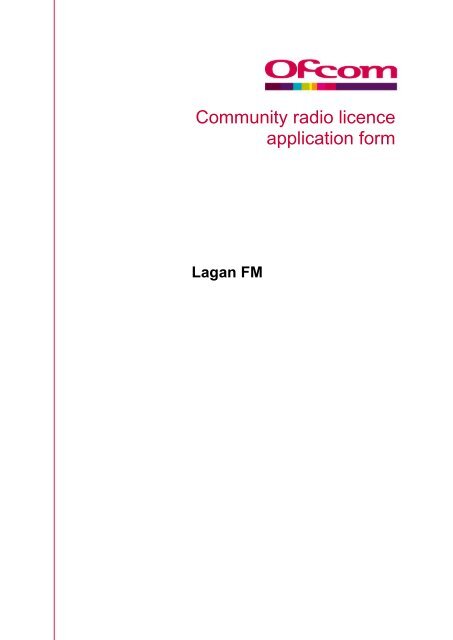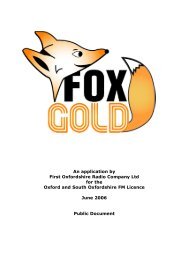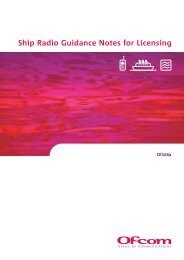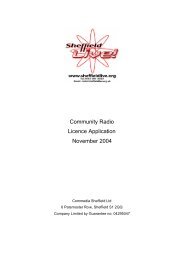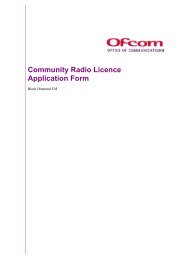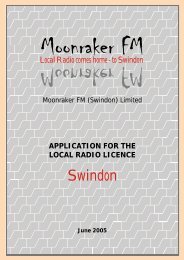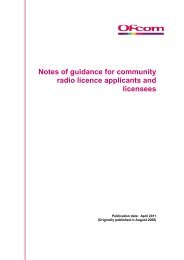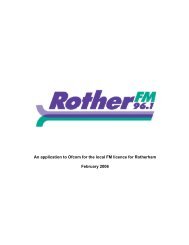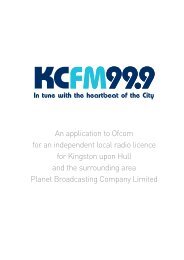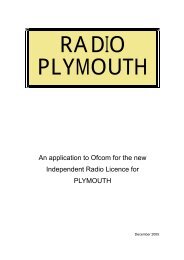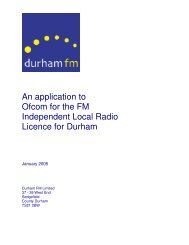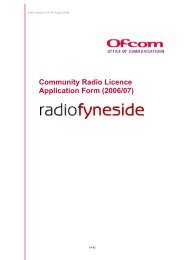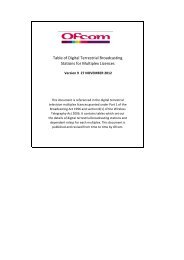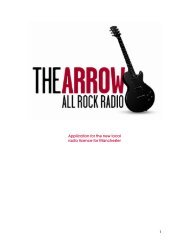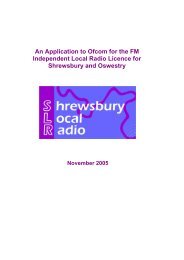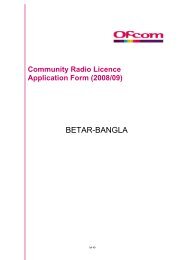Lagan FM - Ofcom Licensing
Lagan FM - Ofcom Licensing
Lagan FM - Ofcom Licensing
You also want an ePaper? Increase the reach of your titles
YUMPU automatically turns print PDFs into web optimized ePapers that Google loves.
Community radio licence<br />
application form<br />
<strong>Lagan</strong> <strong>FM</strong>
<strong>Lagan</strong> <strong>FM</strong> application form<br />
1. Station Name Guidance Notes<br />
What is the proposed station name?<br />
Answer:<br />
<strong>Lagan</strong> <strong>FM</strong><br />
2. Community to be served Guidance Notes<br />
Define the community or communities you are<br />
proposing to serve. Drawing from various sources of<br />
data (e.g. from the Office of Population, Census and<br />
Survey) and in relation to your proposed coverage<br />
area, please determine the size of the population<br />
concerned and the make-up of the population as a<br />
whole, along with any relevant socio-economic<br />
information that would support your application.<br />
(Please tell us the sources of the information you<br />
provide.)<br />
Answer in fewer than 300 words:<br />
1<br />
This is the name you expect to use to identify the station<br />
on air.<br />
It is a legislative requirement that a service is intended<br />
primarily to serve one or more communities (whether or<br />
not it also serves other members of the public) and we<br />
need to understand who comprises that community or<br />
communities. The target community will also be<br />
specified in the licence, if this application is successful.<br />
The legislation defines a ‘community’ as: people who live<br />
or work or undergo education or training in a particular<br />
area or locality, or people who have one or more<br />
interests or characteristics in common.<br />
<strong>Lagan</strong> <strong>FM</strong> will serve the people of Belfast with an emphasis on those from marginalised, ethnic and underserved<br />
communities.<br />
The station will also be positioned towards those aged 30+. Estimated at 365,187, this represents 56.1% of the<br />
population with 19.8% over 60 [1] . 46.8% are male, 53.2% female. 47.2% are Catholic, 48.6% Protestant [2] .<br />
Belfast has 80% of the most deprived wards in Northern Ireland [1] . 35% of residents are income deprived, 13.3%<br />
are claiming DLA, 7% Incapacity Benefit and 15.5% Income Support. [1]<br />
We aim to ‘complete’ the provision of radio services in Belfast by focusing on underserved communities rather<br />
than replicating existing stations. Many people opt in & out of community radio listening according to their<br />
interests and affiliations. Recognising this will enable minority communities to broadcast in their own languages<br />
alongside programming for Ulster Scots, Senior Citizens and community-of-interest groups currently<br />
underserved.<br />
9.4% of Belfast’s population were born outside NI [2] . Estimates show 5,000 Muslims (from 42 Nationalities), 200<br />
Hindu families [2] , and 500 Jews [3] live in Belfast, yet radio schedules don’t reflect this.<br />
Belfast was recently christened “Race Hate Capital of Europe” [3] with 206 racist attacks in 2010/11. [2] Ethnic<br />
minorities make a significant contribution to Belfast’s economic, social and cultural life yet a survey [4] found 25%<br />
of Northern Irish unwilling to have an African, Chinese or Asian person as a neighbour; 20% wouldn’t accept<br />
them as a friend; and 33.3% wouldn’t accept them as work colleagues. This research found racial prejudice is<br />
twice as significant as sectarianism in Northern Ireland [4] . <strong>Lagan</strong> <strong>FM</strong> will celebrate the benefits of the ethnic and<br />
cultural plurality of our city.<br />
Although the River <strong>Lagan</strong> ‘divides’ our city, it‘s also the symbol with which all traditions identify. The <strong>Lagan</strong><br />
Redevelopment in recent years is a beacon of our troubled city’s rebirth. <strong>Lagan</strong><strong>FM</strong> will further this vision through<br />
broadcasting.
3. Proposed area Guidance Notes<br />
<strong>Lagan</strong> <strong>FM</strong> application form<br />
What is the area you propose to serve? It is <strong>Ofcom</strong> policy that community radio stations usually<br />
serve an area of up to a 5 kilometre radius from the<br />
transmission site. See ‘Coverage and planning policy for<br />
analogue radio broadcasting services’.<br />
Answer:<br />
Greater Belfast.<br />
Programmes and programme output:<br />
Definitions:<br />
http://stakeholders.ofcom.org.uk/binaries/broadcast/radi<br />
o-ops/coverage/analogue-coverage-policy.pdf<br />
Studio location: The studio from which the service will be broadcast should be located within the licensed area.<br />
(In some instances, and by prior written agreement from <strong>Ofcom</strong>, it may be acceptable for the primary studio to be<br />
located outside the licensed area.)<br />
Locally-produced: it is anticipated that most stations will produce the bulk of their output themselves, in the<br />
locality. However, for some target communities it may be appropriate for fairly high levels of output to originate<br />
from outside the licensed area.<br />
Live output: is that which is produced by a presenter in the studio at the time of broadcast. The amount of live<br />
output may vary between different services depending on the needs or expectations of the target community.<br />
Original output: All output specifically produced for this service (but excluding repeats and automated material).<br />
Peak time: it may be helpful to state what material will be broadcast in ‘peak time’. If you do, please say what you<br />
consider peak time to be for your target community (this may vary from station to station).<br />
Automated output/voice-tracked material: most stations will carry automated output at some time. The amount of<br />
automated or voice-tracked material does not need to be specified in the key commitments.<br />
Sustaining service/third party produced material: if you intend to broadcast material produced by a different<br />
organisation please state what it is and how much (per day or week as appropriate).<br />
4. Programming output Guidance Notes<br />
Please fill-in all three questions below<br />
Question A asks you to describe your programme<br />
service.<br />
Question B relates to how your output will serve the<br />
tastes and interests of your target community.<br />
Question C is about how your service will broaden<br />
the range of local (non-BBC) services available in<br />
your area.<br />
Later in this form you will be asked to draft your own<br />
‘key commitments’. This will form the basis of your<br />
licence and is what <strong>Ofcom</strong> will judge you against. It<br />
should include a summary of your proposed<br />
programme output as set out below and reflect your<br />
commitment to cater for relevant tastes and interests,<br />
The law requires applicants to state their proposals for<br />
providing a service that would:<br />
(i) cater for the tastes and interests of members of its<br />
target community or communities (or for any<br />
particular tastes and interests in those communities);<br />
(ii) broaden the range of programmes available on non-<br />
BBC local services (commercial and community<br />
stations) to members of the relevant community or<br />
communities;<br />
(iii) broaden the overall range of such non-BBC local<br />
services provided in the area concerned; and<br />
(iv) have a distinct nature, or provide distinct content,<br />
from any non-BBC local services with which it would<br />
overlap.<br />
<strong>Ofcom</strong> is required to consider the extent to which an<br />
applicant’s proposals will cater for the tastes and<br />
2
<strong>Lagan</strong> <strong>FM</strong> application form<br />
to broaden the range of relevant programmes and<br />
services and to provide a service with a distinct<br />
nature and content as set out in the Guidance Notes<br />
in the column opposite.<br />
4. Programming output<br />
3<br />
interests of members of its target community or<br />
communities.<br />
<strong>Ofcom</strong> is also required to consider the extent to which<br />
proposals for a community radio station would broaden<br />
the range of programmes available by way of non-BBC<br />
local services (both commercial and community stations)<br />
in the area concerned (especially, the extent to which a<br />
proposed service would have a distinct nature or provide<br />
distinct content from any overlapping non-BBC local<br />
services).<br />
The information given here should be more detailed than<br />
what you set out in your draft key commitments (later in<br />
this form), and will help us gain a fuller understanding of<br />
how you will serve your target community and what the<br />
station will sound like.<br />
A: Please tell us about your programme service. The following questions may help you describe your<br />
programme service (but should only be used as a guide):<br />
What will the service sound like?<br />
What music will you play?<br />
What are the main speech elements of the service and how will the social gain/community benefits you<br />
propose be reflected on-air?<br />
What is the likely music to speech ratio?<br />
Will this vary at different times of the day or week (or year)?<br />
Do you intend to broadcast live output? If so when and how much do you propose to do?<br />
Will you broadcast in languages other than English (what languages and how much)?<br />
Will your output be original i.e. specifically produced for your service?<br />
Will it be locally produced?<br />
Do you intend to repeat material?<br />
Answer in fewer than 1,000 words:<br />
<strong>Lagan</strong> <strong>FM</strong> will provide a unique, engaging and entertaining service which neither duplicates nor replicates the<br />
provision of commercial stations or other community stations.<br />
This will be reflected in our music policy which will seek to serve an older audience than that provided for by<br />
Belfast’s other English Language community station (Blast106) and which will provide for a wider spectrum of<br />
music than is typically carried by commercial stations. In seeking to include ethnic minority communities, output<br />
will include music which appeals to these communities and which is currently absent from the Belfast airwaves.<br />
We will focus on filling gaps left by other community, commercial or public service broadcasters in their provision<br />
of radio content. Accordingly, the sound of <strong>Lagan</strong> <strong>FM</strong> will be unique and will reflect a diverse output and<br />
increased choice for the listener.<br />
Central to our vision of “completing” the provision of radio services for the people of Belfast will be the diversity of<br />
content that will be generated and produced by community organisations, groups and individuals from across the<br />
city. We use the term ‘Broadcast Publisher’ to describe this relationship where we shall empower groups and<br />
individuals, through extensive training and support, to conceptualise, develop and produce their own<br />
programming. This output may be live, pre-recorded or documentary in nature and it puts the ownership of this<br />
output in the hands of the community itself. Naturally, all programming (live or pre-produced) will be fully<br />
compliant with the Broadcasting Code.<br />
We recognise the void created by the closure of Feile<strong>FM</strong> and the enthusiastic skilled volunteer base which lost<br />
their access to a broadcast medium. <strong>Lagan</strong> <strong>FM</strong> will embrace the return of these volunteers in their variety of<br />
roles. One such example was the Senior Citizens group on Feile<strong>FM</strong> (about whom the BBC-TV documentary<br />
Grey-<strong>FM</strong> was made). We have held discussions with the coordinator of this group who are eager to work with<br />
<strong>Lagan</strong> <strong>FM</strong> to re-launch this programme to serve the senior population of Belfast.<br />
<strong>Lagan</strong> <strong>FM</strong> will operate on a citywide basis to be all-inclusive and ensure equitable representation of both major<br />
religious/political traditions while embracing the wider ethnic, cultural and faith diversity of our city. Through our<br />
broadcasting output, we will seek to positively contribute to the vision of a shared future for the people of Belfast<br />
and to promote the social and economic revitalisation of our city. In this context, we would intend to carry out<br />
regular outside broadcasts to bring the station, and its facilities, right into the heart of the communities that we
serve.<br />
<strong>Lagan</strong> <strong>FM</strong> application form<br />
Speech programming will include news and information; discussion programming focusing on community issues;<br />
and ‘commissioned’ programming made by local groups and organisations for their respective communities. Live<br />
programming will encourage interaction and feedback from listeners through a variety of communicative media.<br />
Overall we would expect the music to speech ratio to be a minimum of 75:25 during live output and pre-produced<br />
programming. The proportion of music output will be higher at night-time, weekends and at other times when the<br />
output is not live.<br />
From our research, and conversations with groups, we anticipate that as well as English, <strong>Lagan</strong> <strong>FM</strong> will include<br />
broadcasting in multiple minority languages to serve the many ethnic communities not currently served by<br />
existing stations. This would include the Chinese community; the Indian and Pakistani communities; the African<br />
communities and the new immigrant communities.<br />
Belfast has a successful Irish Language station (Raidio Failte), however, there is little provision on existing<br />
stations for Ulster Scots. While this would not be a large enough community in Belfast to sustain a fulltime<br />
community radio service of its own, we believe that <strong>Lagan</strong> <strong>FM</strong> will be the perfect medium to advance Ulster Scots<br />
provision in line with the aspirations of the community.<br />
In the words of the Belfast/Good Friday Agreement:<br />
“Participants recognise the importance of respect, understanding and tolerance in relation to linguistic diversity,<br />
including in Northern Ireland, the Irish language, Ulster-Scots and the languages of the various ethnic<br />
communities, all of which are part of the cultural wealth of the island of Ireland.”<br />
Furthermore, the UK government in adopting the European Charter for Regional and Minority Languages agreed<br />
to ‘promote mutual understanding between all linguistic groups and in particular the inclusion of respect,<br />
understanding and tolerance in relation to the Ulster-Scots among the objectives of education and training and<br />
encouragement of the mass media to pursue the same objective’ (Article7, Part3).<br />
Rather than being dictated from the centre, programming will be led by demand and can be provided for any<br />
group that wants to be featured in the schedule. Groups can be formally constituted bodies or just an informal<br />
collection of individuals. This could include disabled groups; arts or sports organisations; historical societies;<br />
charities; educational bodies; and for those of all faiths & none. <strong>Lagan</strong> <strong>FM</strong> will bring together this diverse output<br />
with a Belfast-centric and community-focused output with broad appeal to those aged 30+ so that the plurality of<br />
our programming, and the communities it represents, is brought to a wider public.<br />
Neither of Belfast’s 2 main hospitals (Royal Victoria and City hospitals) have hospital radio. This is a deficiency<br />
that <strong>Lagan</strong> <strong>FM</strong> will seek to address by introducing dedicated programming celebrating our Health Service<br />
professionals and collecting, collating & playing requests for and from patients.<br />
Studios will be located in Belfast and most output will be locally produced. However, in meeting the needs of the<br />
various ethnic communities it is anticipated that some programming may originate from outside Belfast.<br />
Most programming will be original output and will be a mixture of live, pre-recorded and pre-produced output. We<br />
are happy to include repeats of programmes that are of significant interest or importance. We will also happily<br />
carry programming produced by other community broadcasters where this is of interest or relevance to our<br />
community.<br />
Due to the nature of <strong>Lagan</strong> <strong>FM</strong> a significant proportion of programming will always be documentary and preproduced,<br />
however, we would anticipate live output to be a minimum of 40 hours per week.<br />
B: Based on what you have said above, how will your proposed radio service cater for the tastes and<br />
interests of your target community/communities?<br />
Answer in fewer than 400 words:<br />
Taking our ‘Broadcast Publisher’ approach to our broadcasting output will, for the first time in Belfast, place the<br />
tastes and interests of the community centre stage as the content will be developed by the community itself.<br />
This approach means that the ‘tastes and interests’ of the target community will be as defined by the groups and<br />
individuals themselves that make up the community, rather than being defined by a Programme Controller or<br />
Station Manager.<br />
There can be no better way of ensuring that we cater for the tastes and interests of our target<br />
community/communities than by letting them make their own programmes for themselves. <strong>Lagan</strong> <strong>FM</strong> is about<br />
empowering the community to develop concepts for programmes that they want to make and listen to. It is about<br />
providing them with the skills, training and ongoing support to enable them to have full access to a vibrant and<br />
inclusive broadcast medium.<br />
4
<strong>Lagan</strong> <strong>FM</strong> application form<br />
In our conversations with Volunteer Now (the primary body responsible for the promotion of volunteering in<br />
Belfast and across Northern Ireland), they have expressed their support for our approach of putting the<br />
programming in the hands of the community so that groups and individuals can express their needs and<br />
aspirations directly. They have welcomed the opportunity that <strong>Lagan</strong> <strong>FM</strong> will provide for groups and individuals<br />
who were left without provision when Feile<strong>FM</strong> closed and they have expressed their desire to participate directly<br />
in <strong>Lagan</strong> <strong>FM</strong> as a medium by which they can promote the ethos and opportunities of volunteering to a wider<br />
audience.<br />
Our open-door policy towards all groups and individuals and our inclusive approach to the operation and output<br />
of the station means that we will welcome the participation of other groups who may apply for but be<br />
unsuccessful in securing a community radio licence.<br />
<strong>Lagan</strong> <strong>FM</strong> acknowledges that the value of community radio programming cannot be measured in listener<br />
numbers alone. There is merit in the skills, knowledge, confidence and self development that comes from<br />
individuals participating in the making and sharing of programming. This is a key strength of community radio and<br />
<strong>Lagan</strong> <strong>FM</strong> embraces this approach.<br />
Equally we respect the views and opinions of the wider audience in terms of our output and we will be proactive<br />
in seeking feedback so that the service, when taken as a whole, does indeed cater for the tastes and interests of<br />
the entire community.<br />
C: How will your proposed community radio service add to the range of programmes available on non-<br />
BBC local services (commercial and community stations) to members of the relevant community or<br />
communities, add to the overall range of such services in the area concerned and be different and<br />
distinct from them? Please tell us which non-BBC local services your station will overlap with.<br />
Answer in fewer than 400 words:<br />
Belfast is relatively well served by existing stations in terms of the demographics of the city. Blast106 and<br />
Cool<strong>FM</strong> cater for younger people and as we progress demographically we have Citybeat, Downtown and U105<br />
(in addition to BBC Radio Ulster and DAB stations); with the city also served by Raidio Failte (an Irish Language<br />
station).<br />
We believe there is little point in replicating this provision or simply downsizing it to a community level. Currently<br />
the primary model of radio provision is ‘proprietary’ i.e. the output ‘belongs’ to the licence-holder and<br />
programming is decided by what they think the community wants to hear. <strong>Lagan</strong> <strong>FM</strong> will turn this traditional<br />
approach on its head by seeking to be a publisher of content made by the community itself. Groups and<br />
individuals will, with proper training and support, define their own priorities for programming output. In this way we<br />
will fill gaps that exist and provide for a broad spectrum of programming currently absent from Belfast radio<br />
schedules. From multi-lingual programming, arts & culture coverage to a raft of community-of-interest output, we<br />
believe that our approach of being a Broadcaster-Publisher will create for <strong>Lagan</strong> <strong>FM</strong> a sound and identity very<br />
much of its own.<br />
Speech output will focus on community issues and reflect the diversity of our city. Music policy will be different<br />
from that which is already the focus of other community stations and will include music which is absent from the<br />
schedules of commercial stations due to its niche listenership.<br />
In advancing this approach, we held a series of meetings with Directors, Staff and Volunteers of Blast106 to<br />
ensure that we avoid duplicating what they are doing. This has aided us in identifying specific gaps in provision<br />
that they have encountered since they began broadcasting. Blast 106 are endorsing our proposals and have<br />
agreed that we should engage in an ongoing conversation to maximise the social impact of the two stations for<br />
their respective demographic audiences, if we are successful in our application.<br />
With a scarcity of frequencies, we recognise that if <strong>Lagan</strong> <strong>FM</strong> is successful in its licence application this may<br />
mean that other applicants are unsuccessful. In this context, we would certainly welcome the participation of<br />
unsuccessful groups in the output and running of <strong>Lagan</strong> <strong>FM</strong>. Fundamental to <strong>Lagan</strong> <strong>FM</strong> is its inclusivity so there<br />
will likely be proposals in other applications which can be facilitated in our output.<br />
5
Social gain<br />
5. Social gain Guidance Notes<br />
Community radio is required to be for the public good<br />
and to bring community benefits, or social gains, to<br />
listeners and participants. The requirement for ‘social<br />
gain,’ is one of the key factors that makes community<br />
radio stations different from other radio services.<br />
Please tell us what community benefits your service<br />
will bring to your target community(ies) and/or the<br />
general public. Please include summaries of<br />
evidence to support your answer.<br />
Your draft ‘key commitments’ (later in this form)<br />
should include a summary of your proposed social<br />
gain set out below.<br />
Answer in fewer than 1,500 words:<br />
<strong>Lagan</strong> <strong>FM</strong> application form<br />
Broadcasting legislation specifies a number of<br />
‘characteristics of community radio services’. Licence<br />
holders need to ensure their services conform to these<br />
characteristics, including in this case the delivery of<br />
social gain.<br />
The legislation sets out social gains that stations must<br />
provide. These are the achievement, in respect of<br />
individuals or groups of individuals in the target<br />
community, or in respect of other members of the public,<br />
of the following objectives –<br />
(a) the provision of a radio service to individuals who<br />
are otherwise underserved by such services,<br />
(b) the facilitation of discussion and the expression of<br />
opinion,<br />
(c) the provision (whether by means of programmes<br />
included in the service or otherwise) of education or<br />
training to individuals not employed by the station,<br />
and<br />
(d) the better understanding of the particular community<br />
and the strengthening of links within it.<br />
Social gain may also include the achievement of other<br />
objectives of a social nature. 1<br />
Applicants are required to provide evidence that their<br />
service will result in significant social gain to the public<br />
or the target community(ies). Copies of letters or<br />
research reports etc. should not be submitted, but brief<br />
relevant extracts from them, which represent an<br />
accurate and comprehensive summary, may be<br />
included. If we wish to see the source material, we will<br />
ask for it.<br />
<strong>Ofcom</strong> is required to have regard to the extent to which<br />
your proposed service would result in the delivery of<br />
social gain to the public or target community.<br />
<strong>Lagan</strong> <strong>FM</strong> will ‘complete’ the provision of radio services in Belfast by focusing on meeting the broadcasting needs<br />
of underserved communities and our output will be defined by these geographic, ethnic and communities of<br />
interest across Belfast.<br />
At the core of our proposals is our determination to be different. Not just another station which operates the<br />
traditional ‘safe & same’ schedule. We can only bring benefits to our communities if we bring something different<br />
to the broadcasting environment, if we do things in a different way that is community-focused rather than<br />
broadcaster-focused. We will achieve this by broadcasting programming made independently by groups and<br />
individuals from across the city on topics and issues of importance to their community. We will provide the<br />
training, support and resources necessary to empower people to create this programming. In this way, <strong>Lagan</strong> <strong>FM</strong><br />
will truly belong to the people of Belfast because the output itself is generated and owned by them. We believe<br />
that this approach is the real strength of <strong>Lagan</strong> <strong>FM</strong> that will provide lasting social gains for our communities.<br />
<strong>Lagan</strong> Fm will embrace all areas of our city. It will not reinforce sectarian divisions by focusing on the<br />
predominantly Nationalist/Republican West Belfast nor predominantly Unionist/Loyalist East Belfast. Rather,<br />
<strong>Lagan</strong> <strong>FM</strong> will be an inclusive shared resource, contributing to community cohesion, integration and social gain<br />
across traditional sectarian divisions. When Feile<strong>FM</strong> was operating, despite the best efforts of the station, it was<br />
perceived as a service by Nationalists for Nationalists and created a feeling amongst Unionist and Loyalist<br />
communities that they had been excluded from the airwaves. By ensuring that <strong>Lagan</strong> <strong>FM</strong> is positioned as a<br />
neutral community resource and located in a neutral area, it will be a forum for expressing the opinions of all<br />
sections of our community and can be both an instigator and facilitator of discussion between communities and<br />
1 See Article 2(3) of the Community Radio Order 2004 and <strong>Ofcom</strong>’s Notes of guidance for community radio<br />
applicants and licensees.<br />
6
<strong>Lagan</strong> <strong>FM</strong> application form<br />
between different social groups within those communities. The relative peace has highlighted that often working<br />
class groups on both sides of the sectarian divide have more in common with each other than they have with the<br />
middle classes within their own respective communities. However, despite this relative peace, many areas are<br />
still highly segregated along political and religious lines, especially in working class neighbourhoods, known as<br />
interface areas, and marked by flags, graffiti and murals. The tensions of these interface zones has come to the<br />
fore once again within the last month in respect of a proposed redevelopment in North Belfast, with accusations<br />
of voter gerrymandering and sectarian discrimination in housing allocation.<br />
Another key group who are underserved by current output are the ethnic minority groups across our city. Some of<br />
these are new immigrants from Eastern Europe; others are migrant workers who only intend to remain for a<br />
period; and others are well establish settled ethnic communities such as the Chinese and Indian communities,<br />
dispersed across the city.<br />
A report for the Northern Ireland Statistics & Research Agency (Racial Attitudes & Prejudice in Northern Ireland)<br />
found that 25% of people in Northern Ireland were unwilling to have an African, Chinese or Asian person as a<br />
neighbour; 20% wouldn’t accept them as a friend; and 33.3% wouldn’t accept them as work colleagues. It is<br />
shocking that these attitudes remain in the 21 st century and that racism is now replacing sectarianism in Northern<br />
Ireland. <strong>Lagan</strong> <strong>FM</strong> will celebrate the benefits of the ethnic and cultural plurality of our city, and in doing so will<br />
benefit:<br />
1. The minority communities - by providing them with direct access to the airwaves and programming which<br />
celebrates their ethnicity and increases the profile of their cultures. This will contribute to strengthening the<br />
links within these dispersed communities and also enhance their confidence as distinct communities which<br />
contribute greatly to the social, economic and cultural mix of Belfast.<br />
2. The wider community - by addressing the hidden racism that exists and seeking to change mindsets by<br />
creating a better understanding of those communities.<br />
Volunteer Now is Northern Ireland’s key agency for the promotion, support and development of volunteering. It<br />
was formed in 2010 by the merger of 9 Volunteer Centres and the Volunteer Development Agency. It has found<br />
that “formal volunteering is, at best, static since 1995 whilst informal volunteering has fallen substantially from<br />
600,000 in 1995 to 470,000 in 2007”. In their Strategic Plan 2011-2016 they identified that 60% of voluntary and<br />
community organisations said that recruiting volunteers was becoming harder while at the same time 77% of<br />
organisations said they couldn’t operate without them. Furthermore, they found that generally volunteers tend to<br />
be white, middle aged and middle classed; and there is a need to encourage under-represented groups to<br />
volunteer. <strong>Lagan</strong> <strong>FM</strong> has agreed to work in partnership with Volunteer Now on an ongoing basis to actively<br />
promote all forms of volunteering by highlighting both the benefits and opportunities across the city. We believe<br />
that volunteer involvement reflects civic engagement and is at the heart of a vibrant and caring community,<br />
therefore increasing volunteering in our city will be a definite social gain<br />
But, <strong>Lagan</strong> <strong>FM</strong> will be about more than just tackling the big social issues. It will be a resource for other<br />
underserved groups. One such group are the Senior Citizens who had a hugely successful programme<br />
(Afternoon Delight) on Feile <strong>FM</strong> before it closed. This was an important social activity for the large group of<br />
volunteers directly involved in the making of the programme, but it was also a key resource for disseminating<br />
information to the older population about services and activities that would be of interest to them. The group was<br />
also proactive in creating discussion and debate on issues impacting on older people and tackled political<br />
representatives on many occasions about the failings of public services. <strong>Lagan</strong> <strong>FM</strong> will bring this important civic<br />
resource back to the airwaves and we have already agreed this with the group’s coordinator.<br />
The 2011 Census was the first to include a question to establish the Ulster Scots population. As the figures are<br />
not yet published, there are no official figures on the Ulster Scots community in Belfast but the Ulster Scots<br />
Community Network has over 300 member groups. This is a hugely underserved community in Belfast with no<br />
provision on current community or commercial broadcasters in the city. Raidio Failte provides a valuable service<br />
for Irish Language speakers across Greater Belfast and although the Ulster Scots is not thought to be as large a<br />
population, it is still important that space should be afforded on the airwaves for this and <strong>Lagan</strong> <strong>FM</strong> will provide<br />
for this.<br />
Despite being the two largest hospitals in Belfast, neither the Royal Victoria nor City hospitals have hospital radio<br />
services. One of our directors spent 14 years in paediatric nursing and has highlighted the value of dedicated<br />
hospital programming in terms of raising the morale of patients and staff and in communicating information on<br />
hospital services. <strong>Lagan</strong> <strong>FM</strong> will create dedicated space in the schedule to act as a ‘hospital radio service’ for<br />
these 2 major hospitals. We will recruit volunteers who will work with the staff of the hospitals to collect and<br />
collate requests and dedications from patients and staff alike. It can include interviews with patients and staff and<br />
will also be programming that can communicate information on health initiatives and issues concerning the health<br />
services in Belfast.<br />
Our patchwork of independently produced programming is the best way to bring significant and individual social<br />
gain to a number of communities within our city. We will unite this content with a Belfast-centric sustaining<br />
service. However, by not being tied to a fixed schedule of programmes, <strong>Lagan</strong> <strong>FM</strong> will be free to embrace<br />
different events, festivals and initiatives. One example of this would be the period immediately prior to Christmas,<br />
when can ‘rebrand’ the station as ‘<strong>Lagan</strong> Festive <strong>FM</strong>’ which will be a Radio-athon for raising funds for charities.<br />
7
<strong>Lagan</strong> <strong>FM</strong> application form<br />
This is successfully done under RSL-type licences in Dublin and Cork and is a great success both in terms of the<br />
funds raised for good causes and the community support it engenders.<br />
Professor Anthony Everitt stated in 2003 that community radio was “the most important cultural development in<br />
the United Kingdom for many years.” However, if all that community radio ultimately does is to copy the output of<br />
commercial stations and do the same thing on a smaller scale then it is an opportunity missed. We acknowledge<br />
that with our approach we cannot please all of our listeners all of the time, but we aim to please all of our listeners<br />
some of the time. The variety of community created content can ensure that this is achievable and <strong>Lagan</strong> <strong>FM</strong>’s<br />
output, when taken as a whole, will create a broadcasting tapestry of life in our city today. That in itself will be a<br />
real social gain for a city emerging from a troubled past.<br />
Access and participation:<br />
6. Participation in the service Guidance Notes<br />
How do you propose to ensure that members of your<br />
target community (or communities) are given<br />
opportunities to participate in the operation and<br />
management of the service?<br />
Your draft ‘key commitments’ (later in this form)<br />
should include a summary of your proposed<br />
participation objectives as set out below.<br />
Answer in fewer than 400 words:<br />
Volunteer participation is at the heart of what <strong>Lagan</strong> <strong>FM</strong> will do.<br />
Legislation specifies a number of ‘characteristics of<br />
community radio services’. Licence holders need to<br />
ensure their services conform to these characteristics,<br />
including in this case providing opportunities to<br />
participate in the operation and management of the<br />
service. <strong>Ofcom</strong> requires information as to how this would<br />
be achieved.<br />
What will be the involvement of members of the target<br />
community in the radio station? How many volunteers do<br />
you anticipate will be involved in your service per year?<br />
<strong>Lagan</strong> <strong>FM</strong> provides the opportunity for greater civic engagement by more individuals from all backgrounds thus<br />
supporting positive community development, building social capital and contributing to community cohesion<br />
across sectarian and ethnic divisions. This is what we mean when we talk about a ‘Shared Future’ for all in our<br />
city.<br />
<strong>Lagan</strong> <strong>FM</strong>’s approach to volunteering is that it enables people to connect to each other, their community and the<br />
causes they care about. Volunteer involvement will build <strong>Lagan</strong> <strong>FM</strong> as a democratic, sustainable organisation.<br />
Volunteering opportunities with <strong>Lagan</strong> <strong>FM</strong> will be across all the areas of operation of the station from participation<br />
as directors of the company to presenting on-air; and from off-air production to social activities of the station.<br />
The type of activities that volunteers will participate in will include, but are not limited to:<br />
Presenting programmes; Programme production; Feature production; Programme research; News gathering;<br />
Sports coverage; Handling listener response; Programme promotion; Making on-air trails; Fund-raising; Handling<br />
station guests and callers; Listener Research; Marketing; Contributing to the station’s web site; Managing the<br />
station’s social networking sites; Assisting with the delivery of training; Mentoring; Representing the station at<br />
external events; Participating in Boards, Committees and Working Groups; Assisting with Producing Annual<br />
Reports; and General administration.<br />
We aim to have a minimum of 50 volunteers actively, and regularly, participating in the station each year. In<br />
addition to this, we would envisage a wider number of people participating in the life of the station each year on<br />
an irregular basis. One example of this would be students at Belfast Metropolitan College. Through one of our<br />
Directors we would expect to tap into this human resource to work with groups and individuals and assist them to<br />
make their own programming.<br />
7. Access to facilities and training Guidance Notes<br />
Set out the practical (formal and informal)<br />
mechanisms which you will use to ensure that<br />
members of your target community can gain access<br />
to your facilities that would be used for the provision<br />
of your service and to receive training in their use.<br />
Your draft ‘key commitments’ (later in this form)<br />
<strong>Ofcom</strong> is required by the legislation to have regard to the<br />
provision each applicant proposes to make to allow for<br />
access by members of the target community to the<br />
facilities to be used for the provision of the service and<br />
for their training in the use of those facilities.<br />
8
<strong>Lagan</strong> <strong>FM</strong> application form<br />
should include a summary of your proposed access<br />
and objectives for training people in the use of the<br />
facilities as set out below.<br />
Answer in fewer than 400 words:<br />
Training is the key to access, both in terms of skills and confidence.<br />
We looked at a variety of training models in other community radio stations in Northern Ireland, England and the<br />
Republic of Ireland. These range from accredited, examined courses to short hands-on inductions.<br />
One of our Directors was trained by Feile<strong>FM</strong> and then by Blast106 and has assisted in the delivery of training<br />
with Blast106. Another is Senior Lecturer in Broadcast Journalism at Belfast Metropolitan College and therefore<br />
we have access to a variety of quality training resources and models.<br />
We believe that best practice for <strong>Lagan</strong> <strong>FM</strong> will be a 4 stage process:<br />
1. Induction - this will be a 1-to-1 or 1-to-Group meeting between staff/directors of <strong>Lagan</strong> <strong>FM</strong> and the aspirant<br />
volunteer(s). It’s an opportunity to establish what they wish to achieve through their participation in the<br />
station and also to impart the stations objectives to the volunteer(s).<br />
2. Core Training - this will be the basic training required to get volunteer(s) on-air or up to a standard of<br />
creating, researching and recording programmes for output. This will deal with the background to community<br />
radio, station rules, the Broadcasting Code and the theory for good presentation and interview techniques.<br />
3. Mentoring - here the aspirant volunteer(s) will be allocated an experienced Mentor (initially one of the<br />
Directors or Station Manager but over time this will be devolved to Senior Volunteers). Mentoring will be<br />
more hands-on than Core Training with the Mentor showing the technical equipment (broadcast desk,<br />
microphone techniques, playout software, recording equipment and editing packages).<br />
4. Advanced Training - created on a bespoke basis to meet each individual’s needs and to expand their<br />
skillsets over time. This would include volunteers who may wish to diversify the nature of their volunteering -<br />
e.g. a volunteer might want to assist with the book-keeping for the station so we would arrange training to<br />
bring their skill level up to the necessary standard for them to contribute in this way.<br />
In terms of access, in addition to operating an Open-door policy for all volunteers, we would see Outside<br />
Broadcasts as an excellent way of bringing the station into the heart of our communities. Examples would be to<br />
broadcast live from the Indian Community Centre or from community festivals around the city which may be too<br />
small to attract the interest of the BBC or commercial stations.<br />
Ensuring accountability:<br />
8. Accountability Guidance Notes<br />
Please set out your proposed community<br />
accountability mechanisms. These should cover<br />
matters such as:<br />
How will members of your target community:<br />
make contact with your service, and<br />
influence the operation of the service?<br />
How will suggestions or criticisms from members of<br />
your target community (or communities) be<br />
considered and acted upon?<br />
Your draft ‘key commitments’ (later in this form)<br />
should include a summary of your proposed<br />
accountability measures as set out below.<br />
Answer in fewer than 500 words:<br />
9<br />
Broadcasting legislation specifies a number of<br />
‘characteristics of community radio services’. Licence<br />
holders need to ensure their services conform to these<br />
characteristics. One is that, in respect of the provision of<br />
the service, the provider makes itself accountable to the<br />
community (or communities) the service is intended to<br />
serve.<br />
<strong>Ofcom</strong> is required to have regard to the provision each<br />
applicant proposes to make in order to ensure its<br />
accountability to the relevant community (or<br />
communities).<br />
<strong>Lagan</strong> <strong>FM</strong> will only work if it is connected with, and accountable to, the various geographic, ethnic, cultural and<br />
demographic communities it is established to serve.<br />
<strong>Lagan</strong> <strong>FM</strong> will welcome comments, opinions and feedback through a variety of communicative media (email, text,<br />
snail mail etc). We will produce a number of on-air promos to promote the solicitation of this feedback and, in line<br />
with the communities that we serve, these promos will be produced multi-lingually.<br />
We will solicit feedback from our volunteer base to ensure the station is accountable to them and that they can<br />
influence directly how the station is run.
<strong>Lagan</strong> <strong>FM</strong> application form<br />
We will also introduce formal representation mechanisms to ensure that different stakeholder groups can<br />
contribute to the policy and development of the station. This will lead to the establishment of the Management<br />
Committee for the station which will consist of the Directors, the Station Manager, representatives of the<br />
Volunteers and representatives of the key Stakeholder Groups/Communities.<br />
Each year we will publish an Annual Report on the performance of the station against key targets and indicators<br />
and solicit feedback. In addition we will hold an Annual General Meeting and publish the minutes and reports of<br />
this online to ensure these are accessible to the community.<br />
In any research carried out for the station we will attempt to discern more than just crude listener numbers - it will<br />
be as important to understand why people listen as it is to know how many people listen.<br />
<strong>Lagan</strong> <strong>FM</strong> will follow a published Complaints procedure for listeners and the general public and a published<br />
Grievance procedure for our volunteers.<br />
Guidance notes: station’s draft key commitments<br />
Please draft the Key Commitments for your proposed service. There is a blank key commitments document<br />
overleaf. If your organisation is awarded a licence, the key commitments you draft here will form the basis of what<br />
we put in the licence. (Please note: this would be subject to <strong>Ofcom</strong>’s agreement, and we may require it to be<br />
amended, including, for example, to properly reflect legislative requirements).<br />
Your draft Key Commitments should be consistent with, and summarise the answers you have already given in<br />
sections 1-8 of this application form.<br />
Four sample key commitment documents are provided for information at annex 1. These are provided as<br />
illustrations only – it is important that you draft your own commitments, rather than just copying what may have<br />
been done by others, or what we have put in the sample versions. You should keep in mind that it will be a<br />
condition of any licence to meet the Key Commitments: something you must do at all times and for breach of<br />
which you could face sanctions including revocation of the licence. So, you should think carefully about what you<br />
will be committing to.<br />
We would expect key commitments to be brief, and no more than two pages long.<br />
KEY COMMITMENTS: to be completed by the applicant<br />
Station name<br />
[As in section 1 of this application]<br />
Community to be served<br />
[In no more than 30 words describe the<br />
community or communities you will<br />
serve. This should be a summary of<br />
section 2.]<br />
Proposed area<br />
[State the proposed coverage area as<br />
set out in section 3.]<br />
<strong>Lagan</strong> <strong>FM</strong><br />
<strong>Lagan</strong> <strong>FM</strong> will serve the people of Greater Belfast, across the<br />
traditional geographic sectarian divide, with an emphasis on those<br />
aged 30+ and focusing on underserved communities.<br />
Greater Belfast<br />
Programming output<br />
[This should be a summary of the answer you have given in section 4, in no more than 200 words]<br />
<strong>Lagan</strong> <strong>FM</strong> will provide a unique, engaging and entertaining service which avoids simply replicating the provision<br />
of other community and commercial stations.<br />
Our music policy will serve persons aged 30+ and will provide for a wider spectrum of music than typically carried<br />
by other Belfast stations.<br />
Speech programming will include news and information, discussion programming focusing on community issues<br />
and diverse programming made by local groups and individuals for their respective communities. Live<br />
programming will encourage participation and feedback from listeners.<br />
<strong>Lagan</strong> <strong>FM</strong> will operate on a citywide basis and programming will embrace the ethnic and cultural diversity of our<br />
city. We will provide a medium for broadcasting in multiple languages as well as specialist programming for<br />
communities of interest.<br />
10
<strong>Lagan</strong> <strong>FM</strong> application form<br />
Overall it is anticipated that the music to speech ratio will be a minimum of 75:25 during live output and preproduced<br />
programming. The proportion of music output will be higher at night-time, weekends and at other times<br />
when the output is not live.<br />
Studios will be located within the licensed area and at least 75% of output will be locally produced, original and<br />
generally live for at least 40 hours per week.<br />
Social gain<br />
[Summarise the answers you have given in section 5.]<br />
<strong>Lagan</strong> <strong>FM</strong> will reflect the social, ethnic demographic and cultural diversity of Belfast and will offer a variety of<br />
engaging, entertaining and community-produced programming which will contribute to the vision of a shared<br />
future for our city.<br />
<strong>Lagan</strong> <strong>FM</strong> will facilitate community discussion and debate and provide opportunities for listeners to express<br />
ideas and views by a variety of communicative media.<br />
<strong>Lagan</strong> <strong>FM</strong> will maintain a flexible approach to the schedule to facilitate the provision of diverse programming<br />
and features such as multi-lingual programming, radio for Senior Citizens, Outside Broadcasts and On-air<br />
fundraising initiatives<br />
<strong>Lagan</strong> <strong>FM</strong> will actively promote an ethos of volunteering, not alone with the station but also in wider society<br />
and amongst under-represented groups.<br />
Participation in the service<br />
[Summarise the answer you have given in section 6.]<br />
Voluntary participation will be at the heart of all that <strong>Lagan</strong> <strong>FM</strong> does and the station will operate an ‘open<br />
door policy’ towards aspirant volunteers<br />
We will work equally with individuals and groups and we will take all reasonable steps to ensure there are no<br />
barriers to participation.<br />
Volunteering opportunities with will be across all the areas of operation of the station from participation in the<br />
running of the company to presenting on-air; and from the marketing tasks to social activities.<br />
We aim to have a minimum of 50 volunteers actively, and regularly, participating in the station each year.<br />
Access to facilities and training<br />
[Summarise the answer you have given in section 7.]<br />
<strong>Lagan</strong> <strong>FM</strong> will provide full training to all volunteers as it is only through building people’s skills and<br />
confidence that they can play a full part in the life of the station.<br />
<strong>Lagan</strong> <strong>FM</strong> will operate a 4 stage training process for all volunteers, namely Induction, Core Training,<br />
Mentoring and Advanced Training.<br />
<strong>Lagan</strong> <strong>FM</strong> may enter into Service Level Agreements with external bodies which assist us in providing<br />
training and which will contribute to the sustainability of the service throughout the licence period.<br />
In addition to operating an Open-door policy for all volunteers, we would also see Outside Broadcasts as an<br />
excellent way of bringing the station into the heart of our communities.<br />
Accountability<br />
[Summarise the answer you have given in section 8.]<br />
<strong>Lagan</strong> <strong>FM</strong> will be accountable to the community. Informally, comments and opinions will be welcomed<br />
through a variety of communicative media and formally we will introduce representation mechanisms to<br />
ensure that the objectives of the station remain paramount in all that we do and that different stakeholder<br />
groups can contribute to the policy and development of the station.<br />
<strong>Lagan</strong> <strong>FM</strong> will hold an Annual General Meeting and will publish an Annual Report.<br />
<strong>Lagan</strong> <strong>FM</strong> will follow published Complaints and Grievance Procedures.<br />
11
<strong>Lagan</strong> <strong>FM</strong> application form<br />
[Please note: If awarded a licence, the commitments the applicant makes in this section will, subject to <strong>Ofcom</strong>’s<br />
agreement, form the basis of the ‘key commitments’ part of its community radio licence. The headings above are<br />
for applicants’ guidance and will be removed from the final version.]<br />
About your organisation:<br />
9. Company details Guidance Notes<br />
The legislation requires that:<br />
Community radio services should not be provided primarily for commercial reasons or for the financial or<br />
other material gain of the body providing the service or the individuals involved in it<br />
Any profits produced may only be used to either improve the future provision of the service or for the delivery<br />
of social gain to members of the public or the target community<br />
Provide the name of the body corporate (e.g.<br />
company) submitting this application and the type of<br />
body corporate.<br />
Please provide copies of the company’s<br />
Memorandum, Articles of Association and Certificate<br />
of Incorporation (or, where it is another type of body<br />
corporate, its founding documents and those which<br />
set out its objectives and rules of operation)<br />
Answer:<br />
Only a body corporate can hold a community radio<br />
licence. A body corporate is almost always a (registered)<br />
company, although it can also include, for example,<br />
some bodies created by statute (an individual or a<br />
registered charity on its own is not a body corporate).<br />
Your application must therefore be submitted on behalf<br />
of a registered company (or other body corporate).<br />
There are different types of company (e.g. a company<br />
limited by shares, a community interest company, a<br />
company limited by guarantee) and we need to know<br />
what kind of company is applying for a licence.<br />
We will not consider a licence award to a company if it<br />
has not yet been registered. If the application is<br />
successful the licence will be awarded to the body<br />
corporate (e.g. company) submitting this application.<br />
Company (or other body corporate) name: Community Radio for Belfast Limited<br />
Date of registration: 13 th March 2012<br />
Company registration number: NI611687<br />
Type of company (or other body corporate): Company Limited by Guarantee and without Share Issue.<br />
Where your body is not a company, please explain how it meets the requirement to be a body corporate:<br />
N/A<br />
10. Ownership Guidance Notes<br />
Please provide details of who controls and who owns<br />
the body corporate (e.g. company) applying for this<br />
licence, and on what basis this control and ownership<br />
is achieved. (If this will be different once the station<br />
starts broadcasting please say so (a licence is not<br />
issued until broadcasting starts.)<br />
The information provided must include:<br />
all the subscribers, members, shareholders, or<br />
whatever is appropriate for the applicant<br />
company (or body corporate), and state the<br />
extent of their interest (e.g. % shareholding) (if<br />
<strong>Ofcom</strong> needs to know about the ownership of the<br />
company (or other body corporate) applying for this<br />
licence, and any issues regarding its control. We will<br />
also consider how the company (or body corporate) will<br />
be run (this will usually be specified in the Articles of<br />
Association of the company).<br />
In relation to exerting control over the applicant, the<br />
information provided should include the name and<br />
address of any individuals or corporate bodies in<br />
accordance with whose wishes the applicant’s affairs are<br />
or will be conducted in most cases or in significant<br />
12
<strong>Lagan</strong> <strong>FM</strong> application form<br />
13<br />
the company will be controlled by members, but<br />
the members are not yet recruited, please say<br />
so). (You will also be asked about the board of<br />
directors in 11 & 12 below.)<br />
details of any individual, company or other body<br />
that may exert control over the applicant.<br />
Answer:<br />
respects.<br />
Community Radio for Belfast Limited is a company limited by guarantee and without share issue. This means that<br />
the company has no shareholders and it comprises of members.<br />
Currently, as the station is not up and running, the membership of the company is limited to directors (listed in<br />
Section 11). However, opening up the membership is provided for under the Articles of Association. An up to date<br />
list of members will be retained at the company’s Registered Office as required by the Companies Acts.<br />
The Articles of Association are in a form that is approved by HMRC for charitable status. We are awaiting<br />
clarification as to the timescale when the new Charities’ Commission for Northern Ireland will begin to accept<br />
applications for registration. If this is not imminent then we shall apply to HMRC in Liverpool for charitable<br />
exemption.<br />
Ability to maintain the service:<br />
11. Management and operations Guidance Notes<br />
With regard to the applicant please provide:<br />
A list of directors, indicating who is the managing<br />
director and/or chair (please see question 12<br />
regarding directors’ details).<br />
An indication of management structure (e.g.<br />
management committee or equivalent, if<br />
applicable), and/or<br />
Information about who would be responsible for<br />
the day to day management and running of the<br />
station (there is a separate question regarding<br />
other staff below). Explain the role(s) in the<br />
station, job titles, and indicate whether paid or<br />
voluntary, full or part-time (and the number of<br />
hours).<br />
Answer:<br />
Below is a list of the current directors of Blast106:<br />
Dr John Coulter<br />
Mr Christopher Barber<br />
Ms Victoria Kerr<br />
Mr Derek Brum<br />
Mr Noel Maguire<br />
In addition to the notes above on ownership, <strong>Ofcom</strong> is<br />
also required to evaluate the human resources involved<br />
in the running of a community radio station. Answers<br />
should demonstrate how those who have relevant<br />
experience will work for the station. In addition, a<br />
diagram or organisation chart may help paint a clearer<br />
picture.<br />
It is envisaged that <strong>Lagan</strong> <strong>FM</strong> will have a part-time Station Manager (initially 15 hours per week) who<br />
will assume responsibility for the day to day management, administration and running of the station.<br />
The Management Committee for the station will comprise the Station Manager, the Directors,<br />
representatives of key stakeholder groups and representatives of the volunteers.
Stakeholder Orgs &<br />
Community Reps<br />
12. Management and operations Guidance Notes<br />
Please provide information regarding each director as<br />
set out below (some or all of which may be regarded<br />
as confidential).<br />
In addition if any individuals have been identified for<br />
management roles at the proposed station, please<br />
give further information in this section.<br />
Answer (for each director):<br />
Dr John Coulter<br />
Other directorships Not Applicable<br />
Mr Christopher Barber<br />
Other directorships None<br />
Ms Victoria Kerr<br />
Other directorships None<br />
Mr Derek Brum<br />
Other directorships None<br />
Mr Noel Maguire<br />
Other directorships None<br />
Board of Directors<br />
Management Committee<br />
Part Time Station Manager<br />
Senior Volunteers<br />
Team Leaders<br />
Mentors<br />
Volunteers<br />
<strong>Lagan</strong> <strong>FM</strong> application form<br />
Volunteers<br />
Representatives<br />
<strong>Ofcom</strong> needs to know about the proposed directors and<br />
chair of the applicant. Some or all of the information<br />
given in this section will usually be removed from<br />
the publicly available copy of this application form.<br />
(All community radio applications forms will be made<br />
available on our website.) If you request that any<br />
information be removed, please indicate which (and why<br />
by email to community.radio@ofcom.org.uk).<br />
If any individuals (not necessarily directors) have been identified for management roles please state what<br />
experience identified individuals have to undertake the role in question.<br />
14
<strong>Lagan</strong> <strong>FM</strong> application form<br />
13. Staffing structure Guidance Notes<br />
What is the staffing structure of your proposed radio<br />
service? Provide a job title for each position and<br />
indicate whether the individual will be paid or will<br />
work in a voluntary capacity, will be full or part-time<br />
(indicate the number of hours for part-time posts).<br />
This may be provided as a diagram or organisation<br />
chart.<br />
Answer in fewer than 400 words, plus organisation chart (optional):<br />
15<br />
The legislation requires that <strong>Ofcom</strong> has regard to the<br />
applicant’s ability to maintain the proposed service<br />
(as well as to ensure the applicant is fit and proper to<br />
hold the licence). As well as its ownership,<br />
management and operations, the proposed staffing<br />
of the station is relevant to these considerations.<br />
The Directors have carefully considered the need for paid staff to get the station up and running against the<br />
financial cost that this brings and the pressure to secure the funding for this.<br />
We have noted that of the stations operating in Northern Ireland only BFBS stations and Raidio Failte have a<br />
fulltime staffing compliment. Drive 105 do not have a paid Station Manager; Blast106 has a part-time manager<br />
(who we understand is performance related with pay linked to station income and the achievement of key<br />
commitments); Shine in Banbridge do not have a paid Station Manager; IUR<strong>FM</strong> in Newry have a part-time Media<br />
Officer who also works on Community Television and Community Internet projects; and the college stations in<br />
Lisburn, Bangor and Downpatrick share a single staff member between the 3 stations.<br />
Furthermore, having fulltime staff does not necessarily indicates sustainability for the licensed service. Feile<strong>FM</strong><br />
had a number of paid staff, and yet the station failed for financial reasons including its high cost base.<br />
In this context we feel that a part-time Station Manager will be adequate to prepare the station for launch and<br />
manage it in the early years of the licence on the basis of 15 hours per week. However, more important than the<br />
number of hours will be the competence of the candidate and we will offer the position on a salaried or<br />
freelance/contract basis in order to appeal to the widest selection of candidates. The part-time Station Manager<br />
will have a performance related element to their package and will report directly to the Board of Directors. They<br />
will be a non-voting member of the Management Committee.<br />
The Directors have each committed to devoting a minimum of 2 hours each in the period prior to launch and a<br />
minimum of 5 hours per week in the first year of broadcasting. If additional hours are needed then the directors<br />
are committed to meeting these (as detailed in Section 22).<br />
The Directors also recognise the experience of existing community radio stations in Northern Ireland who have<br />
found that over time it is possible to identify Senior Volunteers to whom additional responsibilities and duties can<br />
be devolved which increases the reliable human resource of the station. We believe that the likely age profile of<br />
our volunteers may provide a wealth of experienced and time-rich volunteers (early retirees etc).<br />
14. Applicant’s experience Guidance Notes<br />
Please describe the history of your group, and any<br />
relevant experience of the group, or the individuals<br />
within the group, by answering the questions below.<br />
A. Please provide a brief history of your group.<br />
Answer in fewer than 300 words:<br />
<strong>Ofcom</strong> is required to consider whether an applicant<br />
has the ability to run a community radio station for<br />
the licence period (up to five years). To aid our<br />
consideration we want to know about any relevant<br />
experience the applicant group as a whole, or the<br />
individuals involved, may have.<br />
The company was incorporated just before the licensing round opened, however, the group have been<br />
considering the potential of <strong>Lagan</strong> <strong>FM</strong> ever since Feile<strong>FM</strong> closed and it became apparent that a frequency for<br />
Belfast would be available in the third round of licensing.<br />
The group visited existing stations in Belfast and Newry. John Coulter and Chris Barber’s contacts within<br />
Blast106 meant that discussions could take place to help identify the underserved communities of Belfast and<br />
gaps in current provision so we could avoid duplication. This also enabled us to negotiate a Site-share agreement<br />
with Blast106, reducing our start-up and ongoing costs, as they have a free roof-top site.<br />
In 2011/12 John and Chris acted as guinea pigs for Media Ireland, a community media charity, which was writing<br />
a book about community radio entitled “90% Community-10% Radio”. Their participation in this helped us gain a
<strong>Lagan</strong> <strong>FM</strong> application form<br />
greater understanding of the context of community radio; the application process; the requirements once a<br />
licence is awarded; and preparing for launch.<br />
We have also learned about many of the ongoing requirements of sustaining a community radio station<br />
throughout the entire licence term. The group bring together the core skills that are needed to do this:<br />
John has RSL and teaching experience in Media/Broadcasting.<br />
Chris has community radio experience and experience in training/supporting volunteers<br />
Victoria’s experience in office management (including accounting and record keeping) may be ‘boring’<br />
but is essential in operating a community radio station.<br />
Derek is originally from outside Northern Ireland and has studied Sectarianism in Communities.<br />
Professionally, he has developed Teams in commercial and community settings.<br />
Noel’s technical competence especially in the field of computers, electronics, networking and software<br />
will prove invaluable.<br />
B. Please summarise the group’s broadcasting experience (e.g. internet radio, Restricted Service<br />
Licences (RSLs)).<br />
Answer in fewer than 150 words:<br />
Dr John Coulter lectures in Broadcast Journalism and has co-run a number of RSLs operated by Belfast<br />
Metropolitan College (formerly BIFHE). John negotiated the SLA between the College and Blast106 whereby all<br />
HND students must complete a placement with the station. He previously arranged placements with Feile<strong>FM</strong><br />
prior to its closure. John has worked freelance with a number of commercial and PSB stations.<br />
Chris Barber is an experienced community radio activist who began his broadcasting with Feile<strong>FM</strong>, presenting a<br />
local bands programme for 2 years. Chris has also presented with Blast106 and was elected to its ruling<br />
Executive as Volunteer Coordinator, responsible for the induction, training and mentoring of new volunteers.<br />
Chris brings this invaluable Peer-Mentoring experience to <strong>Lagan</strong> <strong>FM</strong>.<br />
Noel Maguire has been an advertiser on radio and has also built specialist computer equipment (logging<br />
machines, processors and link computers) for the community radio sector and for internet stations.<br />
C. Please summarise the relevant experience of the group or its members, in relevant non-broadcast<br />
areas (such as third sector, local business, fund-raising, training or education).<br />
Answer in fewer than 150 words:<br />
John’s journalism experience will be key to the PR of the station. His professional appointments include Southern<br />
Health and Social Services Council and he’s a dedicated fundraiser for Autism Northern Ireland.<br />
Victoria brings a wealth of experience in the field of Office & Administrative Management. She’s used to<br />
preparing balance sheets, profit & loss and cash-flow statements.<br />
Derek’s experienced in Operations and Sales Management. His particular expertise is in recruitment, training and<br />
mentoring of staff and developing Teams. He holds a Professional Certificate in Business Management.<br />
Noel is cofounder of a leading computer service company. He’s a Microsoft Certified Professional and member of<br />
The Federation of Small Business. He’s been a youth worker with Youth Council, YMCA Ireland and The Peace<br />
People. He’s also spent 15 years as an Emergency Ambulance Technician.<br />
Chris is a former construction worker who can assist with any joinery or maintenance tasks around the station.<br />
D. Please summarise the radio broadcasting experience of key individuals in the applicant group (only if<br />
not already described above).<br />
Answer in fewer than 150 words:<br />
Detailed above in 14.B.<br />
16
<strong>Lagan</strong> <strong>FM</strong> application form<br />
Evidence of demand:<br />
15. Demand and/or support Guidance Notes<br />
Please provide a summary of evidence of demand<br />
and/or support for your proposed service.<br />
This may include a variety of information, for<br />
example:<br />
summary of support from statutory or voluntary<br />
sector organisations which expect to contribute<br />
practically and/or financially to your operations,<br />
or which would expect to collaborate with you in<br />
joint activities;<br />
evidence of interest generated through radio<br />
activity (e.g. RSLs, internet radio), community<br />
activity, training, voluntary sector work etc;<br />
results of research;<br />
summary of support from local politicians,<br />
councils, educational or religious bodies etc;<br />
summary of support from local business or other<br />
sectors;<br />
evidence of support from your proposed target<br />
community.<br />
Answer in fewer than 1,000 words:<br />
Our research into demand and support for the service includes the following:<br />
Independent Field Research<br />
2 Focus Groups<br />
Meeting with key stakeholders (including Volunteer Now)<br />
Consulting with potential volunteer groups<br />
Consulting with local business community<br />
Meeting with an existing Belfast Community Radio Station.<br />
Visiting other Community Radio Stations in Northern Ireland<br />
17<br />
When considering community radio licence applications,<br />
<strong>Ofcom</strong> is required to take into account the extent of local<br />
demand for, or support for, the provision of the proposed<br />
service.<br />
It is for applicants to decide what evidence of demand or<br />
support they wish to submit. However, <strong>Ofcom</strong> does not<br />
believe that generic support for the establishment of a<br />
new radio service is as meaningful as evidence of<br />
considered support for a specific applicant’s proposals.<br />
This means that <strong>Ofcom</strong> does not attach great value to<br />
numerous examples of similar generic or form letters of<br />
support by your group, or to petitions.<br />
Copies of letters or research reports etc. should not be<br />
submitted. However, your response here may include<br />
brief relevant extracts from such material and must<br />
represent an accurate and comprehensive summary of<br />
any such supporting evidence. If we wish to see the<br />
source material, we will ask for it.<br />
Independent Field Research:<br />
BTW Consulting conducted research into radio listenership in Belfast in 2011. This was commissioned by<br />
Blast106 and, with their agreement, we secured a copy of the full report. This research was carried out to a<br />
robust methodology and with a sample size in excess of 500 survey respondents. It was limited to people who<br />
live, work or study in Belfast and demonstrated that the majority of respondents listened to at least two stations in<br />
an average week and the largest single section of respondents listened to three stations.<br />
The research supported the general demographic assumptions of Cool <strong>FM</strong> and Blast106 serving the younger age<br />
groups with Citybeat, Downtown, U105 and BBC Radio Ulster having older listener profiles. It showed that the<br />
majority of people will trial new stations but may not make a permanent switch.<br />
We engaged MD Consulting to conduct additional field research in Belfast in April 2012 to a sample size of 250<br />
respondents (247 eligible responses). This focused on the gaps in current provision and what people would<br />
support in terms of a new station. The questionnaire was designed to be quantitative but the researcher noted<br />
any qualitative feedback given on the forms and included this material in his report.<br />
The result of this research identified a number of key issues:<br />
1. People are generally happy with current provision and any new service needs to offer something different<br />
that they cannot get from existing stations.<br />
2. People agreed, regardless of their own ethnicity, that there was a benefit to programming for ethnic minority<br />
communities. A number of respondents offered the view that such output could serve to break down barriers<br />
between ethnic communities. Two respondents felt that this could be an educational resource for language<br />
students.<br />
3. There was wide support that any new service should be a resource for all sections of the community and<br />
not be centred on either East or West Belfast.<br />
4. There was general acceptance that advertising and sponsorship was appropriate to fund a community<br />
station. A number of respondents indicated that they felt that community stations should have an “ethical” or<br />
“responsible” approach to the nature of the advertising they carried. Less than 20% of respondents<br />
supported community stations being financed through public funding as a replacement to advertising and
sponsorship.<br />
<strong>Lagan</strong> <strong>FM</strong> application form<br />
Focus Groups<br />
2 Focus Group sessions were conducted by a University of Ulster student for his dissertation. These Focus<br />
Groups indicated that the variety of radio services for Belfast is generally good. Some notable niche music<br />
genres were identified as missing along with the lack of multiple presenter programming and an absence of<br />
“different languages” and ‘different accents’ on the airwaves.<br />
The focus groups identified that BBC Radio Ulster was the overwhelming choice for news coverage and people<br />
would flick across to Radio Ulster for the news but then return to their primary station afterwards. The majority of<br />
people in the focus groups listened to radio while doing some other activity and participants description of their<br />
relationship with radio to ranged from “their friend” to “wallpaper” and “background noise”.<br />
Meeting with key stakeholder - Volunteer Now<br />
Volunteer Now (formerly Volunteer Service Belfast) is the primary volunteer agency in Northern Ireland and the<br />
largest in Belfast. We have met with their officers to discuss our proposals and how the station could link with the<br />
strategy for increasing volunteering opportunities in Greater Belfast.<br />
Volunteer Now have confirmed their support for our proposals.<br />
Furthermore, they want to engage with <strong>Lagan</strong> <strong>FM</strong> on an ongoing basis and collaborate in creating commissioned<br />
programming for broadcast on <strong>Lagan</strong> <strong>FM</strong>.<br />
Consulting with potential volunteer groups<br />
We discussed our proposals with a number of former volunteers of Feile <strong>FM</strong> who support and are excited by the<br />
prospect of a new service in which they can get involved once again.<br />
Through Dr John Coulter we expect to collaborate with Belfast Metropolitan College with a view to<br />
intergenerational programming and documentary output.<br />
Consulting with local business community<br />
MD Consulting’s brief included investigating the likely financial support from the local business community.<br />
Drawing from the street research carried out, the potential for sponsorship of programmes and features was of<br />
particular focus. The response was positive but price sensitive with most businesses surveyed prepared to pay<br />
between £50 and £200 per week to sponsor programming. As a direct result of this research we have secured<br />
commitments from 8 businesses totalling £7,200 for front-loaded advertising/sponsorship prior to launch and a<br />
further £1000 in promised donations.<br />
Meeting with an existing Belfast Community Radio Station.<br />
We met with directors and staff at Blast106 community radio on a number of occasions. They indicated to us the<br />
variety of requests that they have received to participate in their service but which they had to turn away as not<br />
fitting in with their Key Commitments. This information, albeit anecdotal, supports our approach that creating a<br />
service to embrace a diverse range of programming will meet a demonstrable need.<br />
Blast106 is supporting our application and have agreed that maintaining an ongoing conversation between the<br />
stations will reduce the chance of replicating each other’s output and duplicating resources which might instead<br />
be shared (e.g. Outside Broadcast equipment and training events, and joint funding applications).<br />
Visiting other Community Radio Stations in Northern Ireland<br />
In addition to visiting Blast106, a number of the Directors visited IUR-<strong>FM</strong> community radio in Newry which<br />
broadcast in 3 languages. This provided an opportunity to discuss the challenges of multilingual programming<br />
and a schedule which has a very diverse content and wide demographic to its listenership and volunteer base.<br />
Ability to maintain the service – financial information:<br />
16. Pre-launch financial information<br />
In assessing an applicant’s ability to maintain the service we need to know what funds and assets it holds, how<br />
much it intends to spend getting the station on-air (pre-launch expenditure), and predicted funding for the prelaunch<br />
period. Please note ‘in-kind’ income is dealt with in 18 below.<br />
Tick this box if you request <strong>Ofcom</strong> to withhold this information from the public copy of your application.<br />
18
<strong>Lagan</strong> <strong>FM</strong> application form<br />
17. Year 1 financial information - income<br />
Please provide information on the predicted income for your first year of broadcasting. N.B. there is a legislative<br />
restriction on income from on-air advertising and sponsorship/commercial references (this is usually 50% of total<br />
annual income (cash and value of in-kind support), but the amount of such income may be more limited in some<br />
cases and some stations cannot take any income from on-air advertising and sponsorship/commercial<br />
references).<br />
Tick this box if you request <strong>Ofcom</strong> to withhold this information from the public copy of your application.<br />
18. Financial information – in-kind support<br />
Please provide totals that reflect the in-kind support you expect to receive for the pre-launch period, and for year<br />
one. You may count some volunteer input as in-kind support – please see our guidance on this<br />
http://stakeholders.ofcom.org.uk/binaries/broadcast/radio-ops/volunteerinput.pdf<br />
Tick this box if you request <strong>Ofcom</strong> to withhold this information from the public copy of your application.<br />
19. Year 1 financial information – outgoings<br />
Please summarise year 1 outgoings – your expected operational expenditure to cover the first 12 months after<br />
the service has commenced broadcasting. (Add rows if necessary).<br />
Tick this box if you request <strong>Ofcom</strong> to withhold this information from the public copy of your application.<br />
20. Year 1 financial information – commercial activities on air<br />
During your first year of broadcasting would your proposed<br />
station carry any on-air advertising? (If so, please state the<br />
amount of income you anticipate from this source and its<br />
anticipated proportion of total income)<br />
If ‘No’ might your proposed service seek to carry on-air<br />
advertising at a later date? (If so, please state the amount<br />
of income you estimate from this source and its estimated<br />
proportion of total income)<br />
During your first year of broadcasting would your proposed<br />
station carry sponsorship or commercial references in<br />
return for payment? (If so, please state the amount of<br />
income you anticipate from this source and its anticipated<br />
proportion of total income)<br />
19<br />
The legislation for<br />
Community Radio<br />
places limits on the<br />
amount of income<br />
annually from the sale<br />
of on-air advertising and<br />
sponsorship that can be<br />
generated.<br />
If ‘No’ might your proposed service seek to carry<br />
sponsorship or commercial references in return for<br />
payment at a later date? (If so, please state the amount of<br />
income you estimate from this source and its estimated<br />
proportion of total income)<br />
Tick this box if you request <strong>Ofcom</strong> to withhold this information from the public copy of your application.<br />
21. Pre-launch financial information - contingency<br />
If there is a shortfall between pre-launch predicted income and outgoings, please explain below how you would<br />
expect to cover any outstanding costs.<br />
Tick this box if you request <strong>Ofcom</strong> to withhold this information from the public copy of your application.<br />
22. Year 1 financial information - contingency<br />
If there is a shortfall between Year 1 income and Year 1 outgoings, please explain below how you would expect<br />
to cover any outstanding costs (see also 23 and 24 below).<br />
Alternatively if there is a surplus at the end of Year 1, please explain what you intend to do with such additional<br />
resources.<br />
Tick this box if you request <strong>Ofcom</strong> to withhold this information from the public copy of your application.
23. Financial information – loans and other borrowings<br />
<strong>Lagan</strong> <strong>FM</strong> application form<br />
If any of your proposed funding (either set-up or operational) is in the form of loans e.g. from directors, individuals<br />
or organisations, please provide details as to who the loan is from and the terms of such lending, expected<br />
repayment terms, interest rate charged and other associated costs.<br />
Tick this box if you request <strong>Ofcom</strong> to withhold this information from the public copy of your application.<br />
24. Financial information – alternative funding streams<br />
If there is a shortfall between income and outgoings, what arrangements have you explored and are in place to<br />
provide further financial and/or ‘in-kind’ support for your proposed service?<br />
If you have any proposals for expanding and/or changing the funding model of your proposed service after the<br />
first year of operation, please provide details below:<br />
Tick this box if you request <strong>Ofcom</strong> to withhold this information from the public copy of your application.<br />
Broadcasting engineering:<br />
Engineering notes<br />
We require preliminary radio frequency (r.f.) engineering information and applicants are advised that this section<br />
is not intended to be exhaustive. We are asking for the basic engineering parameters necessary to determine the<br />
extent of frequency availability in an applicant’s chosen area (after taking account of the requirements of<br />
neighbouring broadcasters). While <strong>Ofcom</strong> would not wish applicants to go to unnecessary expense (we do not<br />
guarantee the availability of a suitable frequency and/or our ability to allocate it for broadcasting from the chosen<br />
transmission site), we do require precise details about the transmission site chosen. The questions following<br />
relate to this.<br />
Applicants should provide evidence of negotiations or agreement with the site owner (e.g. whether a provisional<br />
agreement is in place). Any licence award will be based on the coverage area from the site identified in the<br />
application. If a licence is offered, <strong>Ofcom</strong> may not be able to agree to a change from the site put forward in this<br />
application (and any request for a change will need to be justified).<br />
Applicants should read and be aware of the relevant part of the <strong>Ofcom</strong> Site Engineering Code which may be<br />
found at: http://stakeholders.ofcom.org.uk/broadcasting/guidance/tech-guidance/eng_code/<br />
Community radio stations typically have a coverage area of up to a 5 kilometre radius. Please see <strong>Ofcom</strong>’s<br />
‘Coverage and planning policy for analogue broadcasting services’ (including community radio)<br />
http://stakeholders.ofcom.org.uk/binaries/broadcast/radio-ops/coverage/analogue-coverage-policy.pdf<br />
25. Engineering information<br />
Note: there are fundamental differences between <strong>FM</strong> (VHF) and AM (MF) transmission systems. These include<br />
differences in mast and antenna size, transmitter site requirements, site location, installation cost, audio quality<br />
and night-time interference. Before completing this section, applicants may wish to take professional advice to<br />
ensure they understand these differences and their implications.<br />
Waveband: Is the application for an <strong>FM</strong> licence? Yes<br />
Is the application for an AM licence? No<br />
Should a suitable <strong>FM</strong> frequency be unavailable, would<br />
a frequency on AM be acceptable?<br />
If you have answered YES to this last question please<br />
complete the questions below separately for both an<br />
<strong>FM</strong> transmission site and an AM transmission site.<br />
No<br />
Delete as appropriate<br />
20
<strong>Lagan</strong> <strong>FM</strong> application form<br />
Transmission site<br />
address:<br />
National Grid<br />
Reference (NGR):<br />
About the site’s<br />
dimensions:<br />
About the<br />
transmission site:<br />
Transmission site<br />
availability:<br />
21<br />
Do you understand the fundamental differences<br />
between <strong>FM</strong> (VHF) and AM (MF) services and have you<br />
incorporated these below and in, for example, your<br />
start-up and other costs, detailed earlier?<br />
What is the postal address and post code: Europa Hotel, Great Victoria<br />
Street, Belfast, BT2 7AP<br />
The NGR is a reference code comprising two letters<br />
and two groups of three numbers (e.g. SW 123 456). It<br />
is available from Ordnance Survey. Further information<br />
can be found at:<br />
http://www.ordnancesurvey.co.uk/oswebsite/index.html<br />
What is the height of the site, in metres, Above<br />
Ordnance Datum (AOD)?<br />
In metres, what is the total height of the mast / building<br />
Above Ground level (AGL)?<br />
What is the height, in metres, of the transmitting<br />
antenna AGL?<br />
Please supply photographs of the transmitter mast /<br />
building and aerial location.<br />
Who owns the site and what are their full contact<br />
details?<br />
Is this site already used for broadcasting and if so by<br />
whom?<br />
Yes<br />
IJ 334 738<br />
13 metres<br />
51 metres<br />
54 metres<br />
Tick if enclosed<br />
Tick this box if you request <strong>Ofcom</strong> to withhold this information from the public copy of<br />
this application<br />
Delete as appropriate the yes/no answers which<br />
describe your situation regarding proposed site (it may<br />
be that you cannot answer all four questions):<br />
Site identified? Yes<br />
Provisional agreement with site owner in place? Yes<br />
Or under negotiation? No<br />
Applicant group owns site? No<br />
Other – please specify. N/A<br />
(Note: we cannot consider an application if no site has been identified.)<br />
Delete as appropriate
How to contact you:<br />
26. Public contact details Guidance Notes<br />
Provide the name of the person who will deal with<br />
enquiries from the press and public and the contact<br />
details for them.<br />
Answer here:<br />
Name: Dr John Coulter<br />
E-mail: laganfm@gmail.com<br />
Website: www.laganfm.co.uk<br />
Postal address: First Floor, River House, 48 High Street, Belfast. BT1 2BE.<br />
<strong>Lagan</strong> <strong>FM</strong> application form<br />
<strong>Ofcom</strong> will publish community radio licence applications,<br />
and from time to time statements which may include<br />
public contact details, on its website. A point of contact<br />
is required to deal with press and other enquiries from<br />
interested parties.<br />
PLEASE ENSURE YOU ADVISE OFCOM OF ANY CHANGES TO YOUR CONTACT DETAILS<br />
27. Contact details for <strong>Ofcom</strong> Guidance Notes<br />
Provide the name of the person who will be <strong>Ofcom</strong>’s<br />
primary contact and their contact details:<br />
<strong>Ofcom</strong> will need to contact your group in relation to this<br />
application.<br />
Tick this box if you request <strong>Ofcom</strong> to withhold this information from the public copy of your application.<br />
PLEASE ENSURE YOU ADVISE OFCOM OF ANY CHANGES TO YOUR CONTACT DETAILS<br />
Concluding declaration:<br />
28. Declaration<br />
APPLICANT’S, DIRECTORS’ AND OWNERS’ OTHER INTERESTS<br />
1. In relation to the applicant and any body’s and/or individuals whose details are given in sections 11, 12 and<br />
13 of this application, please state whether the applicant, any body or individual is (and if so identify that<br />
body or individual) involved in any of the activities set out in the table below, and the extent of the<br />
involvement or interest. For these purposes, the applicant includes associates of the applicant (i.e.<br />
directors and their associates and other group companies): (Note: if none of the following categories in this<br />
section apply, this must be clearly indicated by writing “none” in any appropriate box.)<br />
Activity/involvement By the applicant<br />
and/or a shareholder<br />
or member<br />
(section 11 of this<br />
application form)<br />
a) Local authorities None None<br />
b) Bodies whose objects are wholly or mainly of a<br />
political nature, or which are affiliated to such a body<br />
c) Bodies whose objects are wholly or mainly of a<br />
religious nature<br />
d) An individual who is an officer of a body falling within<br />
(c) above<br />
Dr John Coulter’s father<br />
was a MLA (Member of<br />
the Legislative<br />
Assembly for Northern<br />
Ireland) who retired at<br />
the last elections.<br />
John is a member of the<br />
Ulster Unionist Party but<br />
is not politically active<br />
and does not canvas in<br />
elections.<br />
None None<br />
None None<br />
By a director<br />
(section 12 of this<br />
application form)<br />
Dr John Coulter’s father<br />
was a MLA (Member of<br />
the Legislative<br />
Assembly for Northern<br />
Ireland) who retired at<br />
the last elections.<br />
John is a member of the<br />
Ulster Unionist Party but<br />
is not politically active<br />
and does not canvas in<br />
elections.<br />
22
<strong>Lagan</strong> <strong>FM</strong> application form<br />
e) A body corporate which is an associate (as defined in<br />
paragraphs 1(1) and 1(1a) of Part I of Schedule 2 to<br />
the Broadcasting Act 1990) or a body falling within (b)<br />
or (c) above)<br />
f) An advertising agency or an associate of an<br />
advertising agency<br />
g) Other broadcasting interests (including radio,<br />
television, satellite and cable broadcasting and allied<br />
activities).<br />
Other interests<br />
23<br />
None None<br />
None None<br />
Dr John Coulter has<br />
been involved in the<br />
RSL stations operated<br />
each year by Belfast<br />
Metropolitan College<br />
(formerly Belfast<br />
Institute of Further &<br />
Higher Education) as<br />
part of his duties as a<br />
Senior Lecturer and<br />
Course Coordinator.<br />
Christopher Barber was<br />
a volunteer with<br />
Feile<strong>FM</strong> until its closure.<br />
He has also been a<br />
volunteer with Blast106.<br />
Dr John Coulter has<br />
been involved in the<br />
RSL stations operated<br />
each year by Belfast<br />
Metropolitan College<br />
(formerly Belfast<br />
Institute of Further &<br />
Higher Education) as<br />
part of his duties as a<br />
Senior Lecturer and<br />
Course Coordinator.<br />
Christopher Barber was<br />
a volunteer with<br />
Feile<strong>FM</strong> until its closure.<br />
He has also been a<br />
volunteer with Blast106.<br />
2. Give details of any other interest or activity of the applicant which is or could be incompatible with the<br />
requirements imposed by or under Schedule 2 to the Broadcasting Act 1990 (as modified by the<br />
Community Radio Order 2004) and Articles 6 and 7 of the Community Radio Order 2004. Please also<br />
give details of any other participant in the applicant whose interest is or could be incompatible with those<br />
requirements. (You may need to seek advice about these matters)<br />
Answer: None<br />
Other matters<br />
3. In pursuance of its duties under Section 86(4) of the Broadcasting Act 1990 (as amended), <strong>Ofcom</strong><br />
requires that the applicant should notify <strong>Ofcom</strong> of any matters which might influence <strong>Ofcom</strong>’s judgement<br />
as to whether:<br />
(i) the applicant;<br />
(ii) any director of the applicant;<br />
(iii) any individual, or any director of a company, who will have an interest of 5 per cent or more in the<br />
applicant;<br />
may not be considered a 'fit and proper person' to participate in a radio licence. Such matters would<br />
include, for example, the following (whether they occurred in the UK or any other country): any unspent<br />
criminal conviction, any undischarged insolvency and/or bankruptcy orders, any disqualification from being<br />
a director of a limited company, and any adverse findings made by <strong>Ofcom</strong> (or its predecessor broadcast<br />
regulators), any other regulatory authority and/or any court or tribunal in respect of any regulatory matters.<br />
Answer: None<br />
Do you confirm, to the best of your knowledge and belief, that:<br />
4. The applicant is not a disqualified person in relation to the licence by virtue of the provisions of section 143<br />
(5) of the Broadcasting Act 1996 (relating to political objects);<br />
5. The applicant is not otherwise a disqualified person in relation to the licence by virtue of Part II of Schedule 2<br />
to the Broadcasting Act 1990 or any other rule prohibiting its holding the licence;<br />
6. No director, member or other person involved directly or indirectly in the management of the applicant group<br />
is the subject of a disqualification order as defined by section 145 (1) of the Broadcasting Act 1996;<br />
7. No person (body corporate or individual) involved in the application has been convicted within the past five<br />
years of an unauthorised broadcasting offence and that the applicant will do all it can to ensure that no<br />
person (body corporate or individual) so convicted will be concerned in the provision of the service, the<br />
making of programmes included in it, or the operation of the radio station if the applicant is granted a licence;<br />
and<br />
8. Any matters which might influence <strong>Ofcom</strong>'s judgement as to whether the directors or members of the<br />
applicant group are fit and proper persons to participate in a radio licence have been made to <strong>Ofcom</strong>.<br />
Applicants should note that <strong>Ofcom</strong> reserves the right to revoke a licence if at any time any material
<strong>Lagan</strong> <strong>FM</strong> application form<br />
statement made is found to be false and to have been made by the applicant or any member or officer<br />
thereof knowing it to be false, and that in the circumstances of section 144 of the Broadcasting Act 1996,<br />
the provision of false information or the withholding of relevant information with the intention of<br />
misleading <strong>Ofcom</strong> could incur a criminal conviction and a disqualification from the holding of a licence.<br />
Please tick this box to confirm that the applicant agrees with the above statements.<br />
Please tick the boxes below to indicate which additional documentation is included as part of this application. We<br />
are not willing to accept additional information with this application, other than that set out below:<br />
Memorandum & Articles of Association<br />
Certificate of Incorporation<br />
Application Payment (UK £600.00) non-returnable. Paid by CHAPS 1/6/2012 - reference CR CR for Belfast<br />
Photographs of the transmitter mast / building and aerial location.<br />
I hereby apply to <strong>Ofcom</strong> for the grant of a community radio licence and declare that the information given<br />
in this application and any additional documentation is, to the best of my knowledge and belief, correct.<br />
Dr John Coulter (Name of person)<br />
Director<br />
31 st May 2012<br />
(Title or position in the applicant group)<br />
(Date)<br />
24


